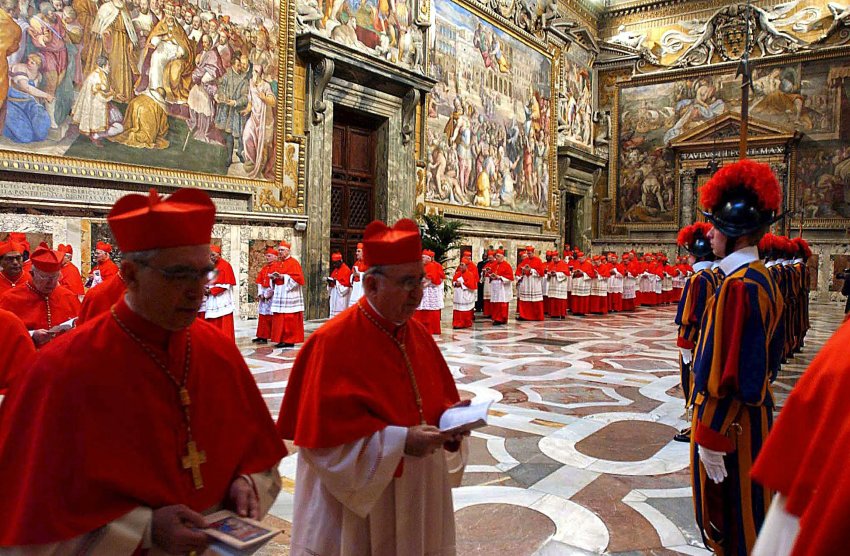COMMENTARY
Hear this, bishops and priests: Catholics’ version of the Arab spring has started, and this week has seen important milestones
People power is all around: think the Arab spring, the protesters outside St Paul’s Cathedral, the national outpouring of outrage over phone hacking and, before that, MPs’ expenses. This week, popular democracy came crashing in on yet another institution in desperate need of reform – the Catholic church, which has been a bastion of power for one of the most tightly-knit, elderly male oligarchies of all time.
What has happened over the past few days might not have looked particularly dramatic, but it has shaken the powers that be in the Catholic church in this country to their core. And although ordinary people didn’t seem to be in the vanguard in the same way they were in the Arab spring, they have played a key role.
What’s happened is this: First, Lord Carlile’s report into a Catholic school in west London, St Benedict’s, has concluded that the monks who run it have been guilty of a “lengthy and cumulative failure” to protect the children in their care from abuse, and that the school’s organisational structure lacks “independence, transparency, accountability and diversity, and is drawn from too narrow a group of people”. It recommends that the Benedictine monks who set the school up should forfeit control of it, and two trusts are now being set up to remove “all power from the abbey”. The new body, says Carlile, should have policies and procedures that are clearly understandable to outsiders, and should have monitoring safeguards in place.
Second, a high court judge has ruled that the church is responsible as an organisation for crimes committed by its priests. This follows a case in which a former resident of a Catholic children’s home in Hampshire alleged that she was raped and assaulted by a priest. Lawyers for the diocese involved, who are arguing that the relationship between a priest and a bishop is different from a normal employee/employer situation, have said they will appeal.
That case is likely to drag on for some years (and will do the church no end of PR disaster along the way); but both it and the Carlile report have something important in common, which they share with other popular movements of recent times. It is this: ordinary people, long repressed and silent, but with great power when they do choose to act, have spoken out. If former pupils from St Benedict’s School in Ealing had not come forward; if the woman from the children’s home (and she is not alone; others are alleging similar abuse) had not spoken out, the changes we have seen this week would never have happened.
And they are enormously significant, because power sharing is an entirely novel concept for those at the top of the Catholic church. Transparent, Lord Carlile? Independent? Accountable? Diverse? Oh, dear me: the bishops may need some explanation as to the very meaning of these concepts. And as to the idea that policies and procedures should be put in place at St Benedict’s that are understandable to outsiders: well, I imagine there are a few splutterings over breakfast cereal at bishops’ residences around the Catholic dioceses of the country this week.
I have been a member of the Catholic church all my life (albeit, sometimes, hanging on by my fingernails); and for me, as for many other Catholics, the problem is that the men who control the church do not see democracy as containing any inherent value. As far as they are concerned, power isn’t devolved from the people, it is imposed from above – from God himself. They believe in a God who makes his wishes known to a small and select group of individuals, individuals who happen to be exclusively male, and rather elderly.
I don’t believe in that God any more, and I suspect and hope that many of my fellow Catholics feel the same. I don’t believe in a God who would not merely allow, but actively want power to be concentrated in the hands of a tiny (male) minority, while the majority had to do as they were told until they discover that what they are being told has been shot through for decades and even centuries with lies, cover-ups, smokescreens and an inability to grasp nettles. I believe in a God whose truths and goodness are located, not in the minds and hearts of a small number of men, but in the minds and hearts of a large number of women and men who care about one another and the wider community and the church itself, and whose views have for too long been ignored.
Rome wasn’t built in a day, and its untenable power structures won’t be dismantled in one either. The Catholic church’s Arab spring will take many years, probably decades, to achieve. But hear this, bishops and priests: our spring has started, and this week’s developments were important milestones. And know this too: the church that will emerge from the ashes of the old guard will be better, and bigger, and kinder, and more honest; it will be transparent, and accountable, and independent, and diverse. But best of all, it will be more Christ-like, too.
Complete Article HERE!

